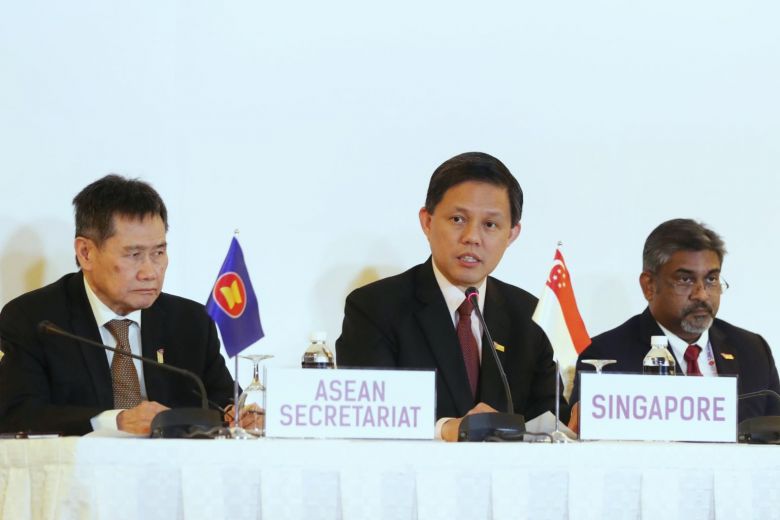
SINGAPORE – Asean has exceeded its energy efficiency goals, reducing its energy intensity by more than 20 per cent in 2016 compared to 2005 levels, well ahead of its 2020 target.
The grouping, which Singapore chairs this year, also said that it would set up green building codes for the entire region, and that it would sign a memorandum of understanding with the International Renewable Energy Agency (Irena).
These were among the several announcements made at the Asean Ministers on Energy Meeting (Amem) on Monday (Oct 29), which was held for the first time together with Singapore International Energy Week.
Minister for Trade and Industry Chan Chun Sing said in his opening speech that holding the two events in the same period was to “facilitate the exchange of ideas between top policymakers and energy industry practitioners”.
“Through stronger collaboration and the sharing of innovative ideas and best practices, we can adopt better ideas to prepare our people, cities and countries to navigate the changing energy landscape.”
Singapore International Energy Week, the annual event that brings together energy industry policymakers and players from around the world, opens on Tuesday (Oct 30).
Mr Chan said on Monday that the Asean energy ministers welcomed the development of green building codes for all countries in the region.
To this end, the Asean Centre for Energy recommended that all member states establish a central body to handle certification and improve coordination between the public and private sector, among other suggestions.
The Asean Centre for Energy will now raise awareness on green codes and building the necessary capabilities in each Asean country to implement the recommendations.
Mr Chan said: “This will enable us to better realise energy savings in the buildings sector, and effectively manage the significant energy demand expected from this sector in the medium term.”
The ministers also gave their support to developing infrastructure for natural gas and liquefied natural gas, a cleaner alternative to coal. They also encouraged the development of Asean’s capability to attract investments and develop sustainable financing models to meet increasing energy demand and improve energy access.
Asean’s memorandum of understanding with Irena will also see both organisations meet regularly to achieve the goal of almost doubling the bloc’s share of renewable energy by 2025, compared with 2016 levels.
Irena will also provide technical support to Asean for green energy planning and technology, and provide the region with tools to support the development and financing of renewable energy projects.
Mr Chan said: “These outcomes showcase the commitment of all 10 Asean countries to deepen regional cooperation and develop mutually beneficial initiatives in the energy space.
“It is important for us to continue working closely together in order to facilitate Asean’s energy transformation to sustain economic growth, generate greater business opportunities and improve lives in the region.”
Sustainable Energy Association of Singapore council member Sanjay Kuttan said that Singapore’s buildings would not be greatly affected by the development of Asean-wide green building codes because the Republic already has “super aggressive” energy efficiency targets for buildings.
“What we’re really going to benefit more from is our companies reaching out to the region and having an influence on other nation’s trajectories and efforts through their expertise.”
Dr Kuttan said: “The region has been talking about deploying renewables for the last decade, and I think that because incumbent politicians and influential conglomerates previously had not been friendly towards renewable energy, there have been political constraints.
“But Monday’s announcements send a signal that governments are now trying to take more concrete steps to signal to the private sector that they should invest in green energy and pave the way for renewable development.




